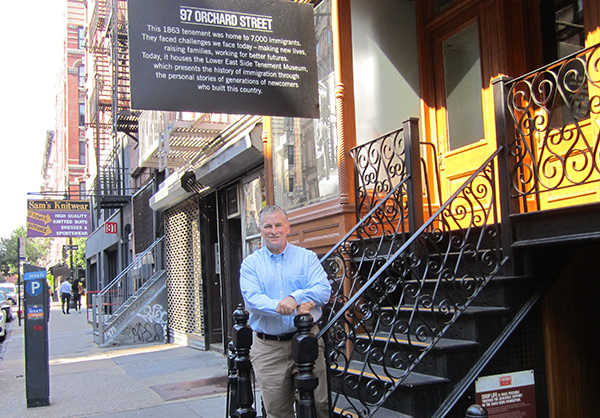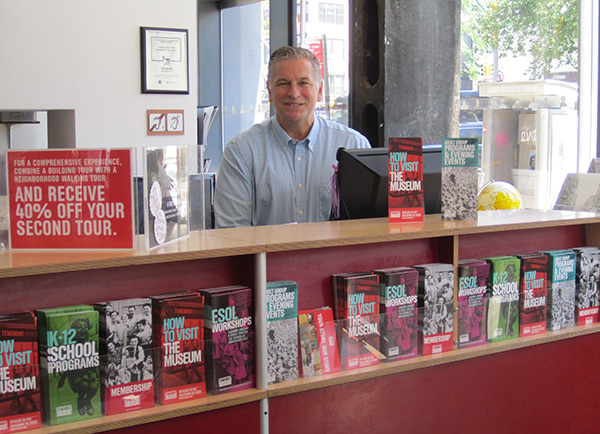Humanizing America’s Immigrants: TC alumnus Kevin Jennings leads New York City’s Tenement Museum

Jennings (M.A.’94) served in the Obama administration as Assistant Deputy Secretary for the Office of Safe and Drug-Free Schools. He co-founded GLSEN, which champions LGBTQ issues in K-12 education, and served as Director of the Arcus Foundation, which promotes global harmony among humans and with the natural world.
For Jennings, though, running the iconic institution on New York City’s Lower East Side, where visitors walk through the tiny apartments of a single building, 97 Orchard Street, which housed some 7,000 new arrivals from Eastern Europe between 1863 and 1935, couldn’t make more sense.
“I’m a history nerd – my mom used to take us on trips to battlefields and museums, even though we didn’t have any money and sometimes slept in the car,” says Jennings, a former history teacher whose first job in college was as a tour guide at Boston’s Paul Revere House. “I grew up in the South, and Faulkner has it right – ‘the past is never dead. It's not even past.’ And there’s no issue about which that’s truer than immigration. This is a nation that has been built and rebuilt by immigrants, yet periodically we try to shut immigration down. Most people today don’t know it, but through the Johnson-Reed Act, immigration was virtually illegal in the United States between 1924 and 1965.”
“I grew up in the South, and Faulkner has it right – ‘the past is never dead. It's not even past.’ And there’s no issue about which that’s truer than immigration. This is a nation that has been built and rebuilt by immigrants, yet periodically we try to shut immigration down.”
The Tenement Museum isn’t an advocacy organization, Jennings says – “I won’t be commenting on Trump’s latest tweets” – but there is no mistaking its point of view. “Everyone at the museum understands that immigration has been a positive force in this country’s history and development. What makes America unique is that we were not founded around a central religion, language or political ideology, but instead around an ideal – we’re dedicated to being the land of opportunity, where people of every background can come. We’ve often fallen short of that ideal – and the Tenement Museum tells that story, too – but it’s the striving toward it that makes us who we are. If we stop doing that, we stop being American.”
The Tenement Museum is, first and foremost, a teaching institution, Jennings says. Through its detailed histories of actual families, and through the visceral experience of the cramped quarters they shared, it teaches that immigrants are people, too.

Jennings’ own great-grandparents were French Canadian, emigrating to Fall River, Massachusetts, to work in the mills. They encountered discrimination and hatred from locals who perceived them as taking jobs away.
“My great grandmother, Aurelie Tessier, would sit on her porch, and people would walk by and shout obscenities. She thought they were greetings, and she’d yell them back. That was how she learned to speak English. It’s a funny story, but it’s repeated every day with today’s immigrants. And that’s so odd. Go back two or three generations in any white family’s history, and you’ll find that we’re all immigrants. So why are the people who, two or three generations back, were being shouted at, doing the shouting now?”
“What makes America unique is that we were not founded around a central religion, language or political ideology, but instead around an ideal – we’re dedicated to being the land of opportunity, where people of every background can come.”
Jennings is quick to praise the work of his predecessor, Morris Vogel, in bringing the Tenement Museum’s offerings into the post-World War II era, and in so doing, making it more multi-cultural. This fall, thanks to Vogel’s efforts, the museum will open a second building, 103 Orchard Street, whose history reflects the rich diversity of the neighborhood during those years. (A virtual tour is already available.) The new exhibit, titled “Under One Roof,” will introduce former resident Bella Epstein, whose parents survived the Holocaust; Jose and Andy Velez, whose mother, a seamstress, came to the city from Puerto Rico; and the Wong siblings, whose mother supported the family by sewing in Chinatown’s garment shops. And later this summer, the museum’s “Tenement Talks” program will host Muneer Ahmed, the Yale Law School professor (and Jennings’ former high school student) who in January helped convince a judge to temporarily stop the Trump administration from deporting foreigners detained at U.S. airports.
For his own part, Jennings, who earned his Teachers College degree through the Klingenstein Center for Independent School Leadership, believes his most important challenge will be to serve as a “change manager” – a role he first learned about in a TC course titled “The Dynamics of School Change,” taught by Linda Darling-Hammond.
“Linda taught us that change isn’t an event, it’s an ongoing process – and that really describes the upheaval that’s going on in the museum world in general right now,” Jennings says. “Like all bricks-and-mortar institutions, we’re asking ourselves, ‘How do we operate in a world where bricks-and-mortar isn’t the most important medium anymore?”
He believes it’s especially critical for the Tenement Museum to create an online experience that matches the power of a live tour – and that doing so will be especially challenging.
“We’re bursting at the seams with physical visitors – we’re open 362 days a year, and we already bring in 60,000 New York City public school kids,” he says. “But what about some kid out in Bozeman, Montana? We want to bring her just as a good an experience through virtual reality and the Internet. And that’s not easy to do, because we don’t have some huge collection. It’s all about being in the buildings and seeing who the people were and how they lived. And we’re the only place where you can do that.” – Joe Levine
Published Tuesday, Jul 18, 2017